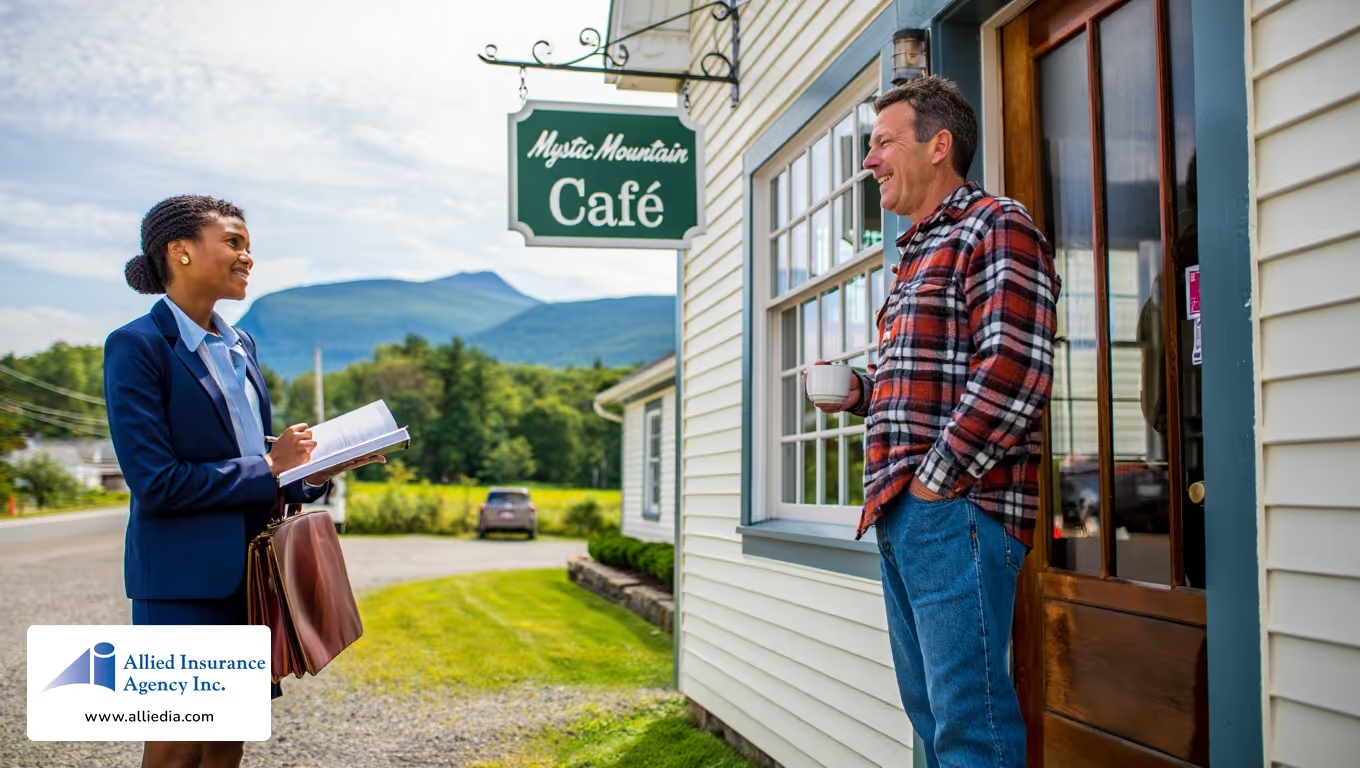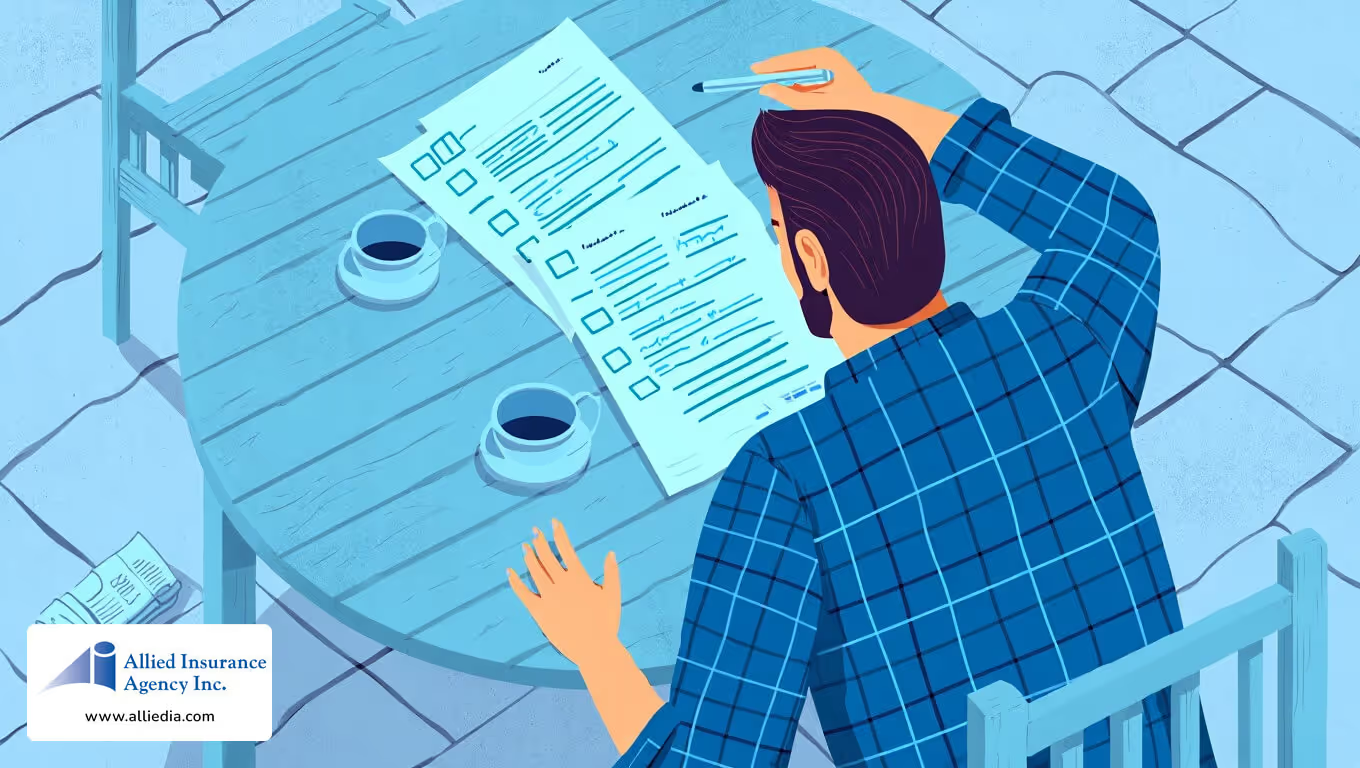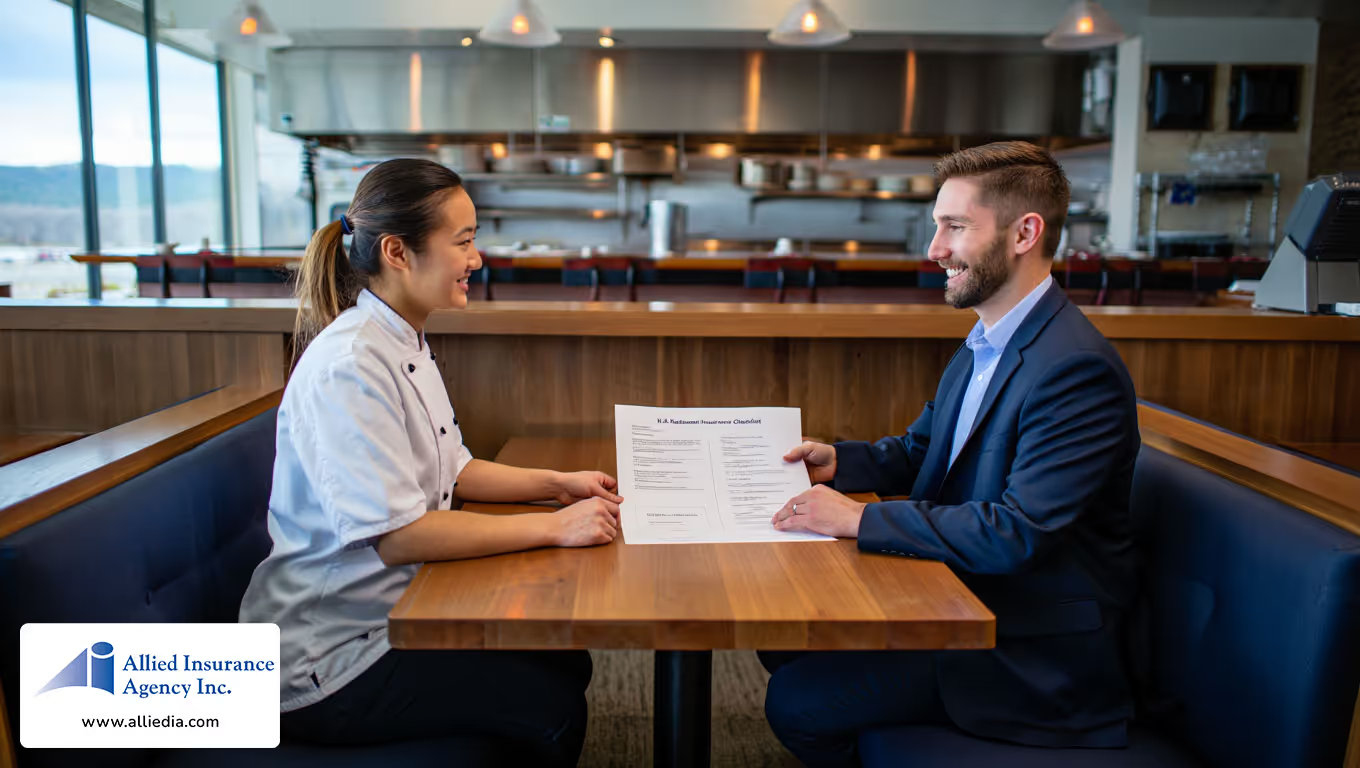
How Much Does Restaurant Insurance Cost in New Hampshire? We Break It Down
Allied Insurance Agency serves Concord, Bow, and Hooksett with local insight for food service operators. This short guide explains typical premiums and why numbers differ by location, staffing, and sales. It flags key benchmarks so owners can set realistic expectations in 2025.
Small operations often see General Liability near $146 per month and a BOP around $214 per month. Workers’ compensation averages about $63 monthly, while a full package can average $359 per month ($4,306 annually).
Seventy-five percent of establishments face a liability claim within three years, so strong risk controls matter. In this state, workers’ comp is mandatory when employees are on payroll and regulators enforce penalties for noncompliance.
The independent-agency advantage is clear: market access, fast comparison, and tailored quotes help owners right-size coverage. Contact Allied Insurance Agency for a free restaurant insurance quote and a practical review of limits, deductibles, and exclusions to protect cash flow and meet lease or legal rules.
Key Takeaways
- Benchmark figures give a starting point, but local factors drive actual premiums.
- A complete package often saves money and offers broader protection than piecemeal buying.
- High early claim frequency means owners should prioritize prevention and documentation.
- Workers’ compensation is required for staff and compliance is strictly enforced.
- Prepare payroll, sales, liquor revenue, seating, and equipment values to speed accurate quoting.
- Independent agents offer quick, side-by-side comparisons for Concord, Bow, and Hooksett operators.
What New Hampshire Restaurant Owners Should Expect in 2025
Across the Granite State, underwriters are tightening terms as they weigh seasonal exposures and downtown foot traffic. An experienced independent NH agency will explain how location, staffing, and liquor share change a policy’s profile and liability assumptions.
Statewide premiums vary because of litigation trends, winter weather hazards, and local business rules. Urban centers like Concord often face higher slip-and-fall and theft assumptions than quieter Bow or some Hooksett areas.
Insurers now price more carefully for alcohol sales, employee counts, and customer density. Inflation and supply chain effects keep replacement values elevated, which raises property and BOP premiums.
- Seasonal swings — ice, frozen pipes, and tourist surges — change loss expectations.
- Consistent training records, cleaning logs, and maintenance reports improve underwriting credibility.
- Reassess seating, delivery radius, and sales mix before renewal to ensure accurate ratings.
- Use mid‑year reviews to adjust limits and deductibles as operations evolve.
- Work with an independent agency to navigate landlord terms and town compliance.
Adopt a proactive claims mindset: report early, document corrective steps, and align food handling protocols with menu risks to reduce long-term renewal impacts.

restaurant insurance cost New Hampshire 2025: Typical Ranges and What’s Included
For many small operators, a few core policies make up the bulk of annual premium — and each line swings with payroll, sales, and location.
Average benchmarks for a small food business are useful planning guides, not quotes. General liability typically runs about $146/month ($1,753/year). Workers compensation averages near $63/month ($760/year). A BOP (property and liability combined) is often around $214/month ($2,566/year). Bundled, a full package commonly lands near $359/month ($4,306/year).
What a complete package usually contains
A standard package pairs general liability with commercial property inside a BOP and adds workers compensation. Where alcohol is served, liquor liability is commonly included or quoted as an add‑on.
How limits and deductibles influence final numbers
Limits usually start at $1M per occurrence / $2M aggregate. Raising limits or lowering deductibles increases premium. Owners should model multiple limit/deductible combos to find the best tradeoff.
- Endorsements like business interruption or food spoilage add measurable premium but protect cash flow after a claim.
- Keep equipment and build‑out values current to avoid underinsurance on a property claim.
- High alcohol revenue or raw‑food menus can trigger higher general liability and liquor liability exposures.
Quick local note: dense downtown locations in Concord often rate higher for liability than lower‑traffic Bow sites, while Hooksett properties may face different property terms if flood risk is present. Independent agents can run scenarios and deliver side‑by‑side quotes so owners can balance limits, deductibles, and premiums.
Local Price Drivers That Change Your Premium in the Granite State
Underwriters price differently for downtown storefronts than for quieter neighborhood sites because exposure changes fast.
Location and foot traffic risks: central business districts in Concord raise slip‑and‑fall and theft assumptions, while quieter corridors in Bow usually see lower liability pressure.
Size, payroll, and sales: staff counts and annual revenue directly drive ratings for general liability and workers coverage. Larger payrolls raise workers premiums across multiple lines.
Liquor sales and service style: the percentage of alcohol revenue and how it is served affect liquor exposure. Responsible server programs and limits on drinks can reduce premium and deductibles.
Claims history, credit, and safety record: a clean loss history and documented training, cleaning logs, and maintenance reports improve terms and may lower renewal increases.
Property values and equipment: keep an up‑to‑date inventory of kitchen equipment and tenant improvements to avoid underinsurance. Hooksett floodplain updates and Bow historic rules can also alter property terms.
- Concord: higher foot traffic elevates slip risks.
- Bow: historic-district rules can affect property underwriting.
- Hooksett: floodplain changes may require endorsements.
- Right‑size seating and delivery radius to align risk with rate.
High frequency of small claims can hurt renewals as much as one large loss. Contact Allied Insurance Agency for a free NH restaurant insurance quote to benchmark scenarios and fine‑tune coverage.
Breakdown by Coverage Type: From General Liability to Liquor and Workers’ Comp
Each coverage type handles specific incidents; combining them smartly protects revenue and reputation after a loss.
General liability: slips, customer injuries, and foodborne illness
General liability responds to slips, trips, falls, customer injuries, and foodborne claims. It also pays legal defense and settlements for covered incidents. Tight cleaning logs and visible signage help underwriters view risk more favorably.
Liquor liability: why operators can’t skip it
Liquor liability is vital where alcohol is served. Premiums hinge on alcohol revenue and server training. Documented policies and responsible‑service programs often lower exposure and support better terms.
Workers’ compensation: requirements and cost levers
Workers compensation is mandatory for payroll staff and is rated per $100 of payroll. Kitchen duties carry higher classifications, so job descriptions, experience modifiers, and safety programs directly affect premiums.
BOP and commercial property coverage
A BOP bundles general liability with property coverage and simplifies administration. It often costs less than buying lines separately and covers equipment, tenant improvements, and property damage from fire or water events.
Optional add-ons: business interruption and cyber
Business interruption replaces lost revenue after covered losses. Cyber endorsements protect POS systems and customer data. Both are worth reviewing as part of a complete policy mix.
- Set limits to satisfy landlords and lenders.
- Value kitchen equipment accurately to avoid underinsurance.
- Review exclusions and endorsements annually.

New Hampshire Laws, Landlord Requirements, and 2025 Compliance Must‑Knows
Compliance and lease language often shape required coverage more than market premium alone. An independent agency in Concord, Bow, and Hooksett helps owners meet state rules and landlord demands before a renewal or inspection.
Workers’ comp obligations and penalties
RSA 281‑A requires workers compensation from the first hire. Firms that lapse or file late face strict penalties and potential business interruption.
Common lease clauses and property endorsements
Many landlords demand specific general liability limits — often $2M aggregate — plus property coverage for tenant improvements. In flood zones, endorsements or higher deductibles are commonly required.
Town‑level nuances and inspections
Concord may link renewals to current fire and life‑safety inspections. Bow projects in historic districts need special endorsements for build‑outs. Hooksett floodplain map changes can alter property terms and deductibles.
Documentation and reporting to avoid fines
- Keep COIs aligned with lease terms, add additional insureds and waivers when required.
- Report employee incidents fast and notify the carrier to preserve benefits and limit disputes.
- Use an annual checklist of limits, endorsements, inspection dates, and claims records.
What Restaurants Pay Across New Hampshire: Concord, Bow, and Hooksett Snapshots
Pricing shifts noticeably between downtown Concord, quieter Bow streets, and parts of Hooksett near mapped flood zones.
General liability often rates higher in Concord due to foot traffic and theft assumptions. A similar operation in Bow usually sees lower liability pressure for the same sales and seating.
Liquor liability depends on alcohol revenue mix and local claim patterns. Higher liquor share draws closer scrutiny and may raise premiums and underwriting conditions.
Seasonality matters: summer tourism can spike sales and exposure, while winter freeze and ice raise slip‑and‑fall and freeze‑related property damage risks.
- Concord: higher foot traffic increases injuries and claims probability.
- Bow: quieter streets often mean steadier terms for like operations.
- Hooksett: floodplain updates can trigger special property terms or higher deductibles.
Owners should budget for modest year‑to‑year fluctuations, document alcohol policies, perform winterization, and check kitchen fire suppression regularly. Periodic reviews with an independent agent help rebalance coverage as operations and claims experience change.
Proven Ways to Lower Your 2025 Insurance Costs Without Cutting Protection
Practical moves can lower premiums while keeping the right protection in place. Small, deliberate changes to policies and operations often produce the biggest long‑term savings for food businesses in the region.
Bundle, raise deductibles, and pay annually
Bundle lines into a BOP to unlock multi‑policy credits without losing core coverage. Set deductibles at levels the business can safely absorb to cut premium meaningfully. When cash flow permits, paying annually often reduces total charges versus monthly billing.
Improve safety and staff training to avoid claims
Underwriters favor documented safety programs. Regular staff training, HACCP practices, non‑slip mats, and freezer logs reduce customer incidents and worker injuries.
Keep maintenance and cleaning logs visible. A clean claims record helps at renewal more than marginal premium tweaks.
Right‑size limits and review coverage regularly
Quarterly checks of seating, sales, payroll, and equipment values keep limits accurate and prevent under‑ or over‑buying. Owners should match limits to lease and lender requirements while avoiding unnecessary excess.
Shop smart with an independent agent
- Compare policy forms and exclusions, not just price.
- Prepare payroll, sales, liquor share, and equipment values before requesting quotes.
- Use an agent to run side‑by‑side scenarios so limits and deductibles align with real exposures.
Next step: Contact Allied Insurance Agency for a free restaurant insurance quote and a practical review of limits, policies, and loss‑control steps tailored to the business.

How an Independent NH Agency Helps You Compare Quotes and Secure Coverage Fast
Accurate inputs let an agent shop multiple markets and deliver apples-to-apples quote comparisons fast. An independent, local advocate translates business facts into underwriting-ready data so owners get real choices, not confusing price sheets.
What to prepare
Gather payroll, sales, seating, liquor share, equipment values, tenant improvements, and loss runs. These items speed quoting and produce more precise, competitive pricing.
Reading quotes: limits, exclusions, and endorsements to watch
Compare beyond premium. Check limits, deductibles, and key exclusions. Watch for must-have endorsements like additional insureds, waiver of subrogation, and flood or business interruption coverage.
From Concord to Hooksett: local insights that fine‑tune your policy
Local details matter. Concord inspection schedules, Bow historic constraints, and Hooksett flood maps can change terms or require endorsements. An independent agent uses these insights to prevent last-minute surprises.
- Provide accurate liquor share to avoid post-bind adjustments.
- Align equipment and property values to prevent underinsurance at claim time.
- Ask for three to five comparative options and narrow by coverage strength and service.
- Set a renewal timeline to update sales, staffing, and values annually.
- Verify claims handling protocols and documentation expectations before binding.
Next step: Contact Allied Insurance Agency for a free business restaurant insurance quote and a practical review of policies, limits, and loss‑control steps tailored to local operations.
Conclusion
A well‑planned protection mix lets owners trade premium for meaningful cover without surprises. Bundle core lines—general liability, property via a BOP, workers’ compensation, and liquor where needed—and add business interruption or cyber only if exposures justify them. This approach aligns limits and deductibles to real operational risks and stabilizes renewals.
Document safety steps, training, and maintenance, and revise policies when sales mix, staffing, seating, or equipment change. Meeting lease and town requirements avoids gaps and uninsured exposures. Strong records also speed claims and can limit downstream premium impact after a loss.
An independent NH agency can compare options quickly and tailor terms to Concord, Bow, and Hooksett realities. For a concise checklist of the most important lines to consider, see the three critical policies in the buyer’s guide. With the right coverage and ongoing risk management, a small food service business can protect margins and focus on growth.



